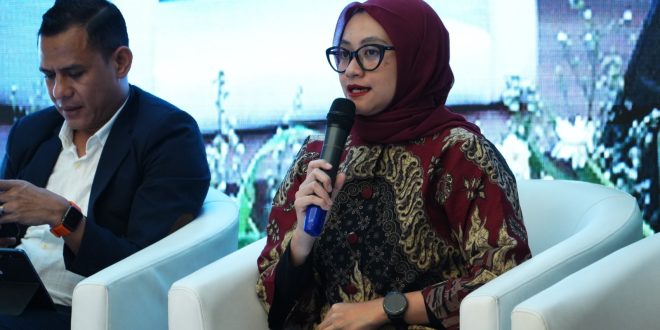Ahead of the 2024 simultaneous elections, the commitment of election organizers to access and transparency of election data is considered important. This has an impact on public trust in the process and organization of elections. Moreover, the 2024 presidential election has left many problems regarding information disclosure and handling election disinformation.
Executive Director of the Association for Elections and Democracy (Perludem) Khoirunnisa Nur Agustyati said that disinformation is not an election issue that is only faced by Indonesia, but is also a global problem. Disinformation can result in the loss of people’s voting rights, especially when it comes to election procedures or technicalities. For this reason, she said collaboration between civil society, government and social media platforms is needed.
“We in civil society encourage multi-stakeholder collaboration in the spread and handling of disinformation. It can’t just be Bawaslu that handles it, but there must also be collaboration with social media platforms, Kominfo, and other organizations,” said Ninis in a Bappenas discussion titled ‘Ensuring Information Disclosure and Handling Disinformation in the 2024 Simultaneous Regional Elections’ in Jakarta (29/5).
Learning from previous elections, Ninis views that it is important for election organizers to immediately clarify false information because hoaxes spread quickly. In addition, it is also necessary to support social media platforms to become a safe space and not tolerate content that incites and spreads hoaxes.
The Indonesian Antifitnah Society (Mafindo) noted that the trend of hoaxes has increased from year to year. In 2023, there were around 2330 hoaxes, almost half of which appeared during the election period. The trend has continued to increase since the 2019 elections with the mode of disinformation shifting from text to photos to videos. According to Ninis, the trend is because videos are more quickly captured by the public than text and images.
In addition, Ninis added, disinformation can also attack election organizers or technicalities, citing the example of the 2019 General Election where the issue of cardboard boxes or ballots had already been cast. The rise of social media is also considered to be a significant means of spreading disinformation, even with verified accounts often also spreading misinformation.
“We recommend that there be deplatformization or deletion of accounts or channels and pages that are monitored to produce and spread election disinformation routinely. Then profiling actors and legal action by Bawaslu, if elements of criminal violations are found,” he explained.
However, Ninis explained, Pilkada has a different local context of disinformation. For this reason, political and digital literacy needs to be improved long before the election day. In addition, election information must also be opened as widely as possible to the public and existing data must be developed so that it can be easily digested by the public at large.
Furthermore, Ninis recommends the KPU to conduct good public communication regarding the process of recapitulation, Sirekap, and determination of election results. In addition, she also encourages the public to detect, analyze, and report disinformation, and make social media platforms provide a special place for credible election information education content.
Related to Sirekap, KPU Commissioner Betty Epsilon Idroos said that her party is trying to develop the utilization of technology development and Big Data to support the opening of election information. The development will then be presented as a data map sourced from Sidapil, Silon, Sidalih, and Sipol aggregation data which will be reduced to the district or city KPU.
“This is a form of open data from the KPU which is still embryonic, only about 70 percent and will be launched after the 2024 Election Results Determination is completed or when the inauguration of the new President will be on October 20, 2024,” Betty said.
Betty realizes that election data disclosure is important because it is valuable information that allows the public and stakeholders to scrutinize including the voter list and see the quality of the voter list. She promised to increase the amount of electoral information that is easily understood by the public.
Meanwhile, Director of the Legislative Monitoring Committee (Kopel) Anwar Razak said that the lack of accurate and transparent information related to the elections could trigger an increase in disinformation circulating in the community. According to him, a lot of incorrect information is widely circulated, but not much can be handled by the authorities.
“Ignorance or confusion with available information is often caused by inaccurate information or no information at all,” Anwar said.
Anwar said that the participation of civil society and the election organizing platform is very important in handling hoaxes. In his view, hoaxes are created deliberately to confuse the public as a political tool. He suggested establishing a special channel for handling hoaxes, so that hoax data can be verified quickly and easily, and carried out openly.
“Tujuannya adalah agar tidak ada pihak tertentu yang terganggu oleh disinformasi yang tidak benar,” ucapnya.
Selain itu ia menilai, beberapa informasi penting yang harus disebarkan kepada publik adalah data dan rekam jejak calon atau profil calon. Menurutnya, informasi tersebut sering kali tidak tersedia di website resmi, padahal publik perlu mengetahui lebih banyak tentang program dan profil calon untuk membuat keputusan yang tepat.
“Dengan memastikan keterbukaan informasi yang efektif, diharapkan masyarakat memperoleh informasi yang akurat dan dapat dipercaya, agar proses pilkada berjalan dengan lebih baik dan transparan,” tutupnya, []
 Rumah Pemilu Indonesia Election Portal
Rumah Pemilu Indonesia Election Portal




